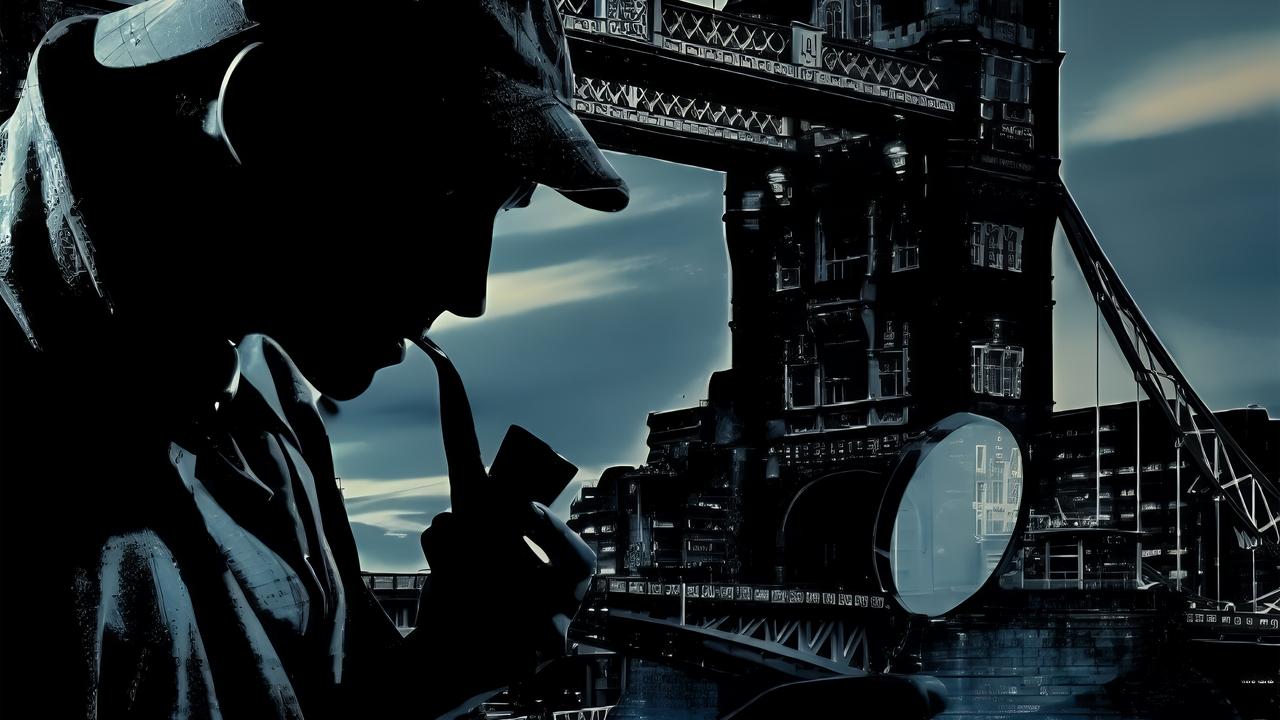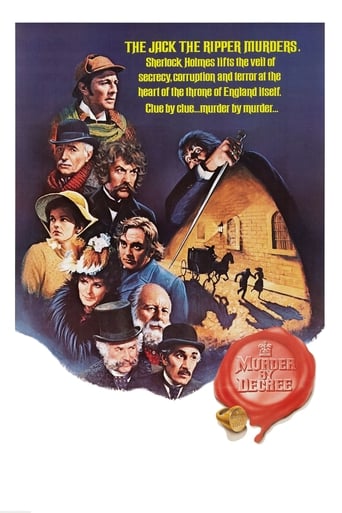

A serial killer is on the loose in the Whitechapel area of London. Leaders of the community come to Sherlock Holmes (Christopher Plummer) and his assistant Dr. Watson (James Mason) for help. Psychic Robert Lees (Donald Sutherland) tells them about his visions of Jack the Ripper. Commissioner Sir Charles Warren puts up roadblocks. Holmes discovers that Sir Charles is a Freemason and referenced in a message from the Ripper about Juwes. Holmes tracks down Mary Kelly. She tells him about a baby and is then kidnapped. This leads to the disturbed Annie Crook (Geneviève Bujold). Inspector Foxborough (David Hemmings) seems to be helpful. Holmes confronts Prime Minister Lord Salisbury (John Gielgud) about the conspiracy.Holmes and Watson are colleagues and sincere investigators. This Watson is not a bumbling fool. The production value is pretty good considering the cost. The actors are all very high quality. Christopher Plummer is a very effective Holmes. It's a lot of foggy murders but not a lot of action. The plot was reused for the movie "From Hell". It's a pretty good crime investigation.
... View MoreNot being sure whether this was based on a book or not, the similarities between this plot and that of "From Hell"'s are too many to be neglected to realize the latter's director was much happier in choosing, to start with, to utterly and completely kill the character of the clairvoyant or "medium", if you like: That character just doesn't belong whatsoever to any Sherlock Holmes story (either by Conan Doyle himself or not) taking itself seriously. Utterly and completely unnecessary to its development! Then we have the acting: great actors but mostly, seeming completely out of place.The great James Mason has his TNT-like potential confined to a tired, old fart (too old actually) of a Watson.Not to mention the unfortunate decision to turn his notoriously witty and clever character into some sort of comedy relief - take the pea scene, for instance: he was told to dither and procrastinates too much for a true Watson! From Nigel Bruce to Jude Law and Martin Freeman, I'm still to see such a demeaning portrayal of the good doctor.Then we have Holmes. Unlike the original character, the director quite possibly prompted by the producers, have managed, in their quite apparent failed attempt to make him more human, to almost make him cry like a five year old, scaredy girl. Oh my, where to start? He's lost that truly Sherlockian "certainty". Sherlock Holmes shouldn't just ASK so many questions: he DEDUCES, pure and simply! Specially, as I mentioned earlier, bow to a bloody medium in trying to solve his case!! He's just not sure of his surroundings: at the funeral, why has he suddenly lost his powers to deduce the bad guys are still following him and are therefore certain to track Mary Kelly down via him carelessly taking them to her? For this review's size sake, I won't even delve into other flimsy character portrayals but believe me: it is really mostly other appalling portrayals to watch! But there are still positive point nonetheless. The scenery, props (sometimes a bit overdone, skulls with blinking lights longing at Sherlock's studio and so on and finally, the great Victorian London atmosphere they still managed to pull out regardless. Hence my rating it a point above a weak 5.
... View MoreWhat more could you ask for in a film: Christopher Plummer, James Mason, Anthony Quayle, John Gielgud, Frank Finlay, Donald Sutherland, and Geneviève Bujold, and a great supporting cast? That's two Oscar winners and four nominees; a great cast!The film features warfare between the classes, clashing political programs, and widespread confusion abut sex and insanity. It touches on Freemasons and parapsychology, too. Plummer is excellent as Holmes, and Sutherland is really creepy as a medium.A thrilling tale of murder and politics.
... View MoreWarning, spoilers ahead.Christopher Plummer is one of those actors who seem born to play Holmes. He has perfect facial features and a cold, precise manner. His performance is spot-on as the middle aged Holmes. James Mason is one of the best Dr. Watsons on film. He's no blundering fool, though he's mistaken for one a few times in this film.Enjoy a great teaming of Holmes and Watson, because the story is weak.Possibly to make up for a limp storyline, this film is populated with good actors in bit parts. Two of the smallest parts are Donald Sutherland as psychic Robert Lees, and Geneviève Bujold, appearing for mere minutes, as a madhouse inmate. Toward the end, John Gielgud pops his head in to say "Hi" as the Prime Minister.Anthony Quayle keeps his angry hat on as the head honcho of the police. Inspectors Lestrade (a very fine Frank Finlay) and Foxborough (David Hemmings) come off a lot better, exchanging quips with Holmes and Watson while seeking Jack the Ripper.Though the "Royal Conspiracy" Jack the Ripper theory went through quite a vogue during the seventies and eighties, it has now been completely discredited. They might still have hammered a decent story out of this farrago of nonsense (farragos of nonsense often make great movies), if they had supplied a better ending. In fact, when the "Ripper" is discovered it's disappointing as it was not properly foreshadowed. Nor is the killer one of the big names in the cast, which would have helped. There's a lot of speechifying near the end to clear up what we just saw, but it's lame."Murder by Decree" was first announced with Peter O'Toole as Holmes, which had great potential. With O'Toole as Holmes, Anthony Quayle might have made a noteworthy Watson. Instead, according to the director's commentary, they wanted Laurence Olivier. But bad blood existed between the two "O" actors O'Toole and Olivier, and in the end neither came on board.Still, Plummer and Mason make a fine pairing, and it's too bad they didn't make more Holmes outings before Mason's death in 1984.Unfortunately, this is not the post-Jeremy Brett Holmes where Sherlock can dress like a human being. He gallivants around London in a deerstalker hat and cape meant for country wear -- even flipping his deerstalker on his head while leaving the opera! He looks ludicrous. But his acting is impeccable.
... View More